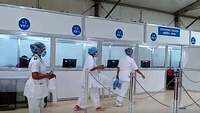
Ranchi: An IAS officer from the Jharkhand cadre and an academician from a state university played key roles in formulation and finalisation of the new Nationtional Education Policy (NEP) 2020, which was passed by the Union Cabinet on Wednesday.
Amit Khare, who is currently the secretary higher education in the Union ministry of education, is a Jharkhand cadre officer and he along with Dr R S Kurreel, former vice-chancellor of the Birsa Agriculture University (BAU) and currently serving as the director of extension education in the university, had to face numerous challenges while finalising the NEP.
Khare was given the charge of school education in October 2019 and higher education in December of the same year. He expedited the formulation of the NEP incorporating numerous suggestions forwarded by experts, state governments, panchayat secretaries and the common people. Apart from preserving Indian traditions, the NEP has incorporated the requirements of a changing world, Khare said.
He said, “The NEP lays special focus on developing core capabilities related to livelihood among children. It also stresses on world-class research works and high-quality education. Under the new policy, the students will get multiple options regarding exiting and rejoining any course at the graduation level.”
For Khare, NEP was one of his biggest challenges, a policy revised for the first time in 34 years after the last one in 1986. He said the policy needed to be foolproof to get the final nod. Khare, who had earlier served as Jharkhand education secretary and vice-chancellor of the Ranchi University, was well aware of the existing education system and the pressing need for a revision.
Dr Kureel, who has also served as vice-chancellor of Dr B R Ambedkar University of Social Science, Indore, was one of the NEP drafting committee members. Union HRD minister Ramesh Pokhriyal called up Dr Kureel on Wednesday to congratulate him after the passage of the policy by the Union cabinet.
The former BAU vice-chancellor said the drafting committee for the NEP was formed on June 24, 2017 and it submitted a 384-page report in May 2019. He said, “It was a huge exercise as we consulted hundreds of academicians, heads of Council for Scientific and Industrial Research, religious institutions, Vidya Bharti, universities and other sources and included recommendations of the previous Subramanian Committee on Education before drafting the policy. My focal area was higher education. One of the main recommendations was to convert the universities into research hubs instead of being merely an educational centre.”
Dr Kureel said each university has to play the triple role of providing education, research and technology transfer.
Amit Khare, who is currently the secretary higher education in the Union ministry of education, is a Jharkhand cadre officer and he along with Dr R S Kurreel, former vice-chancellor of the Birsa Agriculture University (BAU) and currently serving as the director of extension education in the university, had to face numerous challenges while finalising the NEP.
Khare was given the charge of school education in October 2019 and higher education in December of the same year. He expedited the formulation of the NEP incorporating numerous suggestions forwarded by experts, state governments, panchayat secretaries and the common people. Apart from preserving Indian traditions, the NEP has incorporated the requirements of a changing world, Khare said.
He said, “The NEP lays special focus on developing core capabilities related to livelihood among children. It also stresses on world-class research works and high-quality education. Under the new policy, the students will get multiple options regarding exiting and rejoining any course at the graduation level.”
For Khare, NEP was one of his biggest challenges, a policy revised for the first time in 34 years after the last one in 1986. He said the policy needed to be foolproof to get the final nod. Khare, who had earlier served as Jharkhand education secretary and vice-chancellor of the Ranchi University, was well aware of the existing education system and the pressing need for a revision.
Dr Kureel, who has also served as vice-chancellor of Dr B R Ambedkar University of Social Science, Indore, was one of the NEP drafting committee members. Union HRD minister Ramesh Pokhriyal called up Dr Kureel on Wednesday to congratulate him after the passage of the policy by the Union cabinet.
The former BAU vice-chancellor said the drafting committee for the NEP was formed on June 24, 2017 and it submitted a 384-page report in May 2019. He said, “It was a huge exercise as we consulted hundreds of academicians, heads of Council for Scientific and Industrial Research, religious institutions, Vidya Bharti, universities and other sources and included recommendations of the previous Subramanian Committee on Education before drafting the policy. My focal area was higher education. One of the main recommendations was to convert the universities into research hubs instead of being merely an educational centre.”
Dr Kureel said each university has to play the triple role of providing education, research and technology transfer.

Coronavirus outbreak
Trending Topics
LATEST VIDEOS
City
 Karnataka: Car washed away in stream, narrow escape for passengers
Karnataka: Car washed away in stream, narrow escape for passengers  Bizarre violation of Covid-19 norms: Kerala businessman holds roadshow with new Mercedes Benz, booked
Bizarre violation of Covid-19 norms: Kerala businessman holds roadshow with new Mercedes Benz, booked  Mumbai: Tata Memorial Hospital pitches in for Covid care
Mumbai: Tata Memorial Hospital pitches in for Covid care  Shocking: West Bengal BJP booth worker’s body found hanging from tree, family blames TMC
Shocking: West Bengal BJP booth worker’s body found hanging from tree, family blames TMC
More from TOI
Navbharat Times
Featured Today in Travel
Quick Links
Kerala Coronavirus Helpline NumberHaryana Coronavirus Helpline NumberUP Coronavirus Helpline NumberBareilly NewsBhopal NewsCoronavirus in DelhiCoronavirus in HyderabadCoronavirus in IndiaCoronavirus symptomsCoronavirusRajasthan Coronavirus Helpline NumberAditya ThackerayShiv SenaFire in MumbaiAP Coronavirus Helpline NumberArvind KejriwalJammu Kashmir Coronavirus Helpline NumberSrinagar encounter
Get the app



